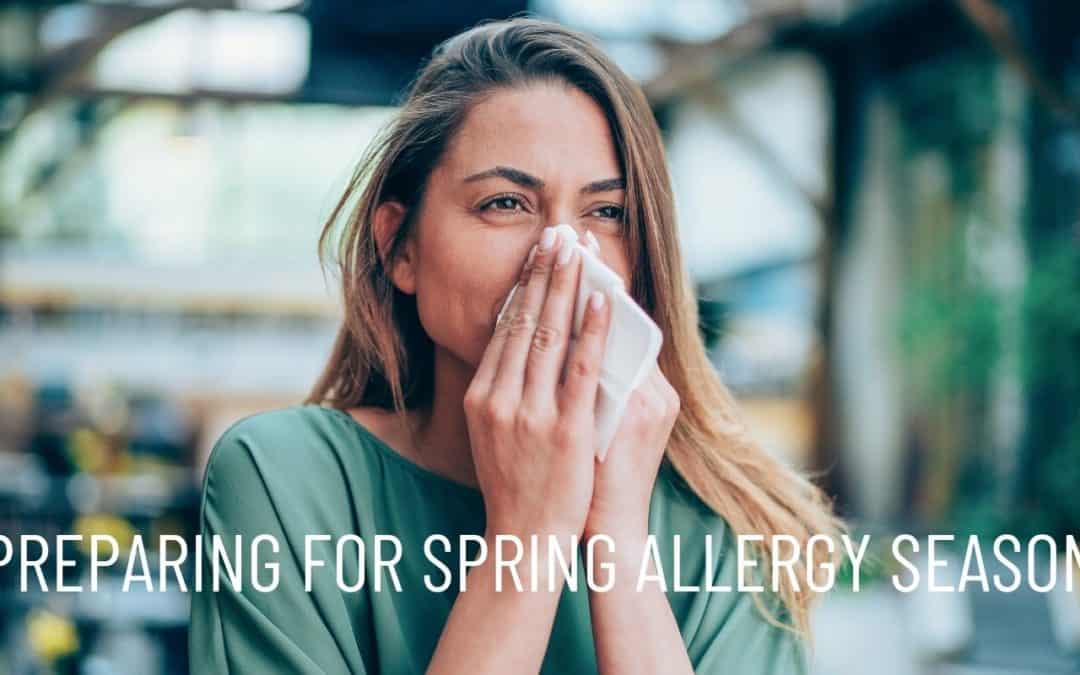As Spring approaches, many of us are increasingly excited about the sun and warmer temperatures. But the changing of seasons also means an increase of pollen and mold in the environment, activating springtime allergies. Allergies are the most common type of health issue people experience today. According to the Centers for Disease Control and Prevention (CDC), more than 50 million people deal with allergies every year. Additionally, allergies impact as much as 30% of adults and 40% of children in the United States. Taking the time to prepare for this season and practicing strategies to minimize your exposure can significantly alleviate symptoms, allowing you to fully enjoy the Spring!
What are spring allergies?
Spring allergies, or allergic rhinitis, is a reaction that people have to substances that are more commonly experienced during the spring season. Allergies occur when the body’s immune system overreacts to a substance that is not typically harmful. When the body comes into contact with these substances, called allergens, the immune system mistakenly interprets them as hazardous. This activates its response system to neutralize the substance so it doesn’t cause sickness. This includes creating and releasing allergic antibodies which target and eliminate the allergen. This happens by causing cells to release chemicals like histamine into the bloodstream. This process and reaction to an allergen that is not inherently dangerous, creates the symptoms we associate with allergies: itchy/watery eyes, sneezing, congestion, scratchy throat, swelling, hives, stomach, breathing difficulties, etc.
The most common allergen is pollen – a substance that is released by trees to fertilize other plants. With blooming plant life during the Spring, pollen count also reaches its peak. Another pervasive allergen is mold which is a type of fungi that grows in humid indoor as well as outdoor spaces. Changing temperatures help these spaces retain more moisture, contributing to greater mold. People are exposed to these allergens through the air which means that they are airborne allergies that are inhaled. Allergy symptoms can disrupt daily life by causing someone to feel unwell, reducing the capacity to engage in daily activities.
Tips to Prepare for Allergy Season
There are several measures you can take to best prepare and navigate allergy season. A few useful tips include the following:
- See an allergist. Before Spring is in full effect, see an ENT (ear, nose, throat) doctor to be tested for allergies. Understanding what your allergies are is the first step toward finding the right treatment options. Your healthcare provider can also recommend medications, therapies, and strategies to best navigate your allergies.
- Reduce exposure to pollen. Pollen is the main culprit that activates allergies during the Spring season. There are numerous ways you can reduce your exposure including:
- Track pollen count: you can do this by checking in with your local weather resources. When the pollen count is high, avoid being outside and close your windows.
- Clean often: this includes focusing on areas where pollen tends to accumulate – air filters, bedding, furniture, carpets, etc. You should vacuum often, change filters regularly, and wash your bedding and clothes often.
- Change clothes: be sure to change your clothes when you enter your home after being outside. Also be sure to shower so you can get rid of pollen on your face or hair, preventing it from transferring to your pillows/bedding.
- Mold proof your home. This focuses on decreasing mold exposure by focusing on arrears where mold tends to accumulate: kitchen, basement, bathroom. A few strategies to do this are:
- Check for and repair any leaks in pipes or roofs.
- Ensure there is proper ventilation in these spaces.
- Remove mold from any surfaces with water and detergent
- Find the right medications for you. There are various over-the-counter medications that people use to treat allergy symptoms. This includes antihistamines and decongestants which relieve common allergy symptoms. It is important to identify the specific medications that work for you and start taking them early. In addition to over-the-counter medications, there are home remedies you can also try: neti pot, tea, using steam to alleviate sinus pressure, dehumidifier, etc.
Contact us to learn more about how you can best navigate your allergies during the Spring. We offer a range of services and treatments that can provide long-lasting relief, allowing you to move through the Spring with greater ease and joy.

